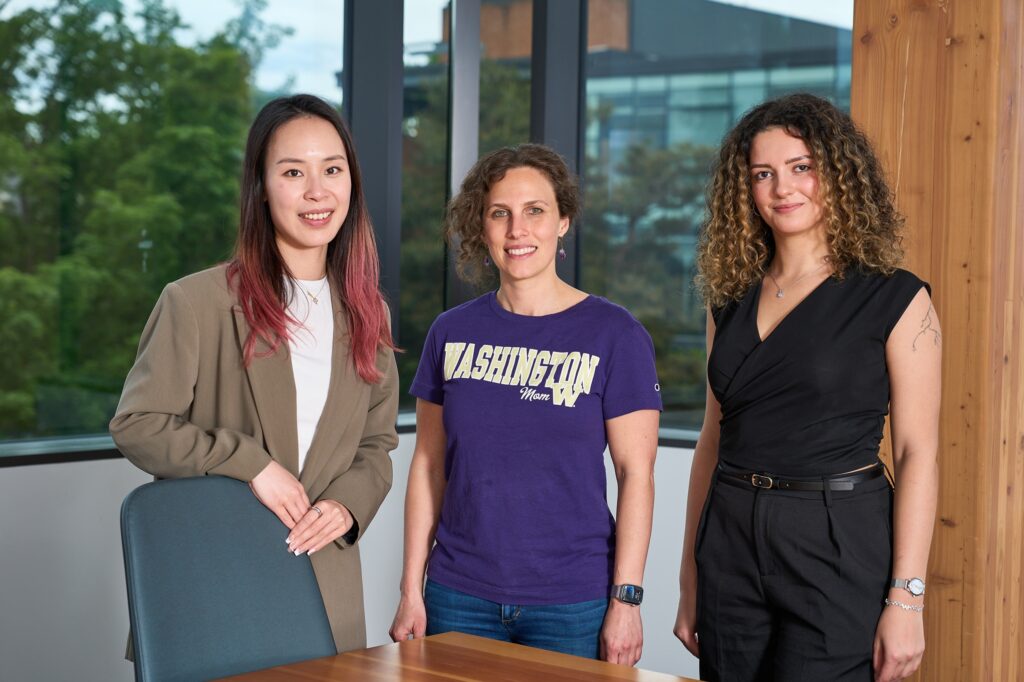Mentorship with Purpose: The MSBA’s Secret Weapon
Master of Science in Business Analytics (MSBA) mentorship program builds confidence and career readiness
At the Foster School of Business, mentoring is a competitive advantage.
For students in the Master of Science in Business Analytics (MSBA) who are preparing for careers as business analysts and data experts, mentoring isn’t a buzzword. It’s a powerful and personalized part of the student experience that’s built into the program.
The Master’s in Business Analytics combines technical skills, analytic frameworks, and business insights. The mentorship program is a natural extension of this training, connecting aspiring business analysts with mentors who use these skills daily. Mentors come from companies like Salesforce, Starbucks, T-Mobile, and top consulting firms; many are Foster alumni who’ve walked the same path.
“Students aren’t just looking for advice; they’re looking for someone who’s been through similar challenges and can speak from experience,” explains Liz Satwicz, Associate Director of Industry Partnerships and Community Relations at the Foster School. “Foster built this program in response to that need. It’s structured to support honest, practical conversations that are guided by mentors who are approachable, thoughtful, and invested in helping students navigate a pivotal year.”

Connecting with a mentor
At its core, the MSBA Mentorship Program helps business analytics students navigate the toughest parts of early career development. It takes the guesswork out of finding a mentor. The Foster team handles the matching process based on each student’s interests, career goals, and experience level, so every match is intentional.
“From the first icebreaker event, my mentor brought structure to his mentorship approach,” says Smita Kulkarni (MSBA 2025) of her mentor Sarthak Ratnu (pictured below). “He began by walking us through the potential roles suitable for MSBA graduates — business analyst, data scientist, machine learning scientist — and outlined the skill sets required for each. This helped us evaluate our strengths and align our goals realistically. A visit to the Amazon Spheres with him offered a firsthand glimpse into the day-to-day life of a business intelligence engineer, making the industry feel more tangible.”
Mentors are experienced career veterans who remember what it was like to launch a job search. They bring tactical, real-world advice on everything from networking to understanding how to position yourself in a competitive job market.
“My mentor’s story about moving from consulting to tech made me reflect on what I truly want to pursue in the long run,” recalls Iris Hsieh (MSBA 2025). “He shared how his consulting background helped him build broad industry knowledge and versatile skills, which laid a strong foundation for his career. Eventually, he realized he wanted to drive more direct business impact and shifted to tech, which got me thinking more intentionally about the kind of work that aligns with my strengths and interests.”
Hsieh is one of many students who have found that mentorship shapes not just how they think but also what they pursue next.

Built-in support for MSBA students navigating career choices
Mentoring for Business Analytics students is personal. A small group of two to four students is matched with a business analytics expert. In addition to regular meetings, resume reviews, and mock interviews, mentors tailor the activities to match each student’s professional goals.
“Business analytics mentees gain access to real-world perspectives, career guidance, and personalized support. It helps them bridge the gap between academic learning and professional success,” said mentor and Microsoft Edge Product Growth & Incubation leader Owen Ho (MSBA 2015).
Ho’s recent mentees couldn’t agree more.
Serena Fang (MSBA 2025) recalls, “Having a mentor like Owen Ho gave me clarity on how to apply what I was learning in practical, results-driven ways. More importantly, it helped me understand how to align my skills and accomplishments with the expectations and needs of the job market.”
Hsieh added, “My mentor, Owen Ho, provided valuable insights on what truly matters when pivoting careers: building on existing hard skills, cultivating the functional skills required for the target role, and staying adaptable to new roles.”

Tangible Takeaways
According to MSBA students, mentoring isn’t just about who you know; it’s about who knows you and believes in your potential. Students who participated in the mentorship program cited a wide range of benefits. Among them:
- A clearer sense of career direction
- Industry-specific resources and advice
- Skill-building for interviews and public speaking
- Resume reviews and portfolio feedback
- Insight into roles they hadn’t considered
- Introductions to hiring managers and their mentors’ colleagues
- Company visits, private tours, and behind-the-scenes perspectives
Ho, an experienced mentor, believes the program’s most significant benefit is personalized support and real-time information on what’s happening in the business world. “I hope to offer guidance, encouragement, and practical advice to help students build professional confidence, make informed decisions, and develop the skills and mindset needed to thrive in their future careers and job hunt.”
More Than Just a Career Boost
Students consistently describe the MSBA mentorship experience as a highlight of their time at the Foster School of Business. When MSBA students graduate, they don’t just leave with technical skills; they leave with a career ally and a clear path forward.
Learn more about the Master of Science in Business Analytics here.
Hero photo (from left): MSBA student Xinyi Zhang, mentor Sam Affolter, and MSBA student Van Khanh “Alison” Tang showing their Husky pride with a “W” sign.
